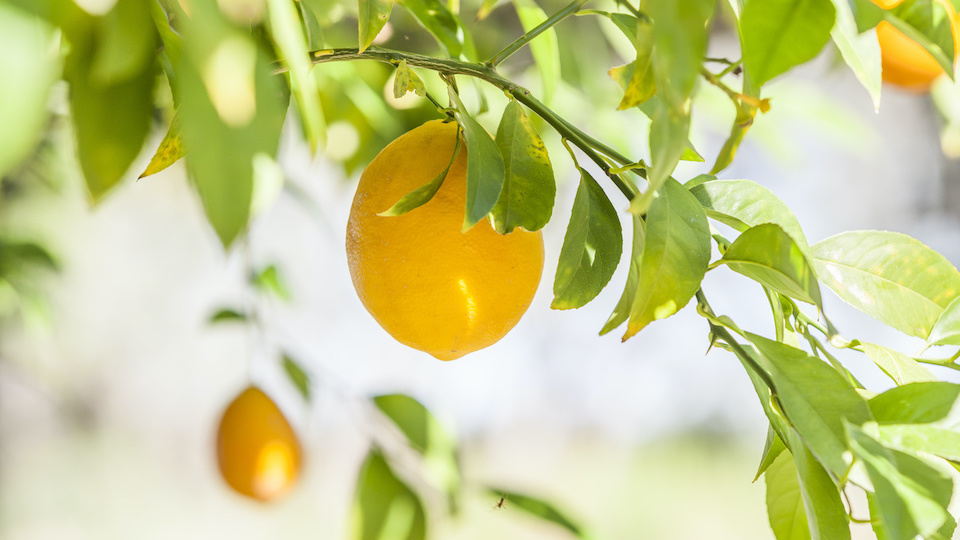Lemons, one of the most popular citrus fruits of all time. Along with other fruits and vegetables, Christopher Columbus brought lemons with him on his second voyage to the New World in 1493, and they have been growing in Florida since the sixteenth century.
Besides large amounts of vitamin C, lemons also contain riboflavin, thiamin, iron, magnesium, pantothenic acid, fiber, vitamin B6, potassium, copper, calcium, and folate.
Vitamin C is the most important antioxidant found in nature. This vitamin neutralizes free radicals both inside and outside of cells. Free radicals are responsible for damaging cells and cellular membranes, leading to inflammation and accelerated aging.
Free radicals can also damage blood vessels and alter cholesterol so that it builds up on artery walls. Vitamin C helps prevent this buildup, and promotes a healthy heart, and supports balanced blood sugar.
When “under the weather season” arrives, it is always a good idea to keep a bag of fresh lemons handy. The citric acid, bioflavonoids, vitamin C, calcium, pectin, and limonene do a great job of boosting your immune system and keeping infections at bay.
Growing lemons
Unless you live in a tropical climate such as Florida, growing lemons all-year-long outdoors is difficult. However, the good news is that dwarf lemon trees are easy to grow indoors as long as you place them in a sunny window and give them the TLC they need.
Lemons are a very rewarding houseplant, with the most common type being Meyer lemons. Here are a few things to keep in mind when growing them.
- Containers must have adequate drainage and room for growth. Lemons reach 3 to 5 feet when grown indoors.
- Provide well-draining, slightly acidic soil, and keep it evenly moist.
- Temperatures of 70 degrees F during the day and 55 degrees F at night are best for lemon trees. They will go into dormancy if temperatures fall below 55 degrees F.
- Allow the soil to dry out before watering.
- Fertilize regularly using a nitrogen fertilizer designed for citrus trees. The best time to fertilize is between April and September. Don’t feed during the late fall and winter months.
Use lemons to brighten your skin
As mentioned above, lemons contain a powerful combination of antioxidants and nutrients along with citric acid. This makes them an excellent skin brightener, cleanser, and toner.
Lemon Skin Brightener
Mix 2 tablespoons of freshly squeezed lemon juice with 3 tablespoons of water (mineral water is preferable, but tap water is fine). Use your hands or a damp cloth to rub the mixture onto your face and neck. Leave it on for 30 minutes and then wash off with cool or lukewarm water.
To really see results, repeat this process every day for a few weeks. Consider putting a drop of raw honey into your mixture to reduce skin irritation and add hydration to the mix each time.
Lemons for blemishes
Lemons can work to reduce blemishes by decreasing the amount of oil caused by bacteria. Make a simple blemish mixture by adding a few teaspoons of lemon juice to a tablespoon of raw honey. Pat the mixture over your skin and allow it to sit for about fifteen minutes. Rinse off with cool water and pat dry with a clean cloth.
Lemons for whiter teeth
Everyone likes a set of pearly whites, but obtaining such a set can be difficult without a costly — and possibly toxic — visit to your dentist. Lemons can provide the solution: Mix a small amount of baking soda with freshly squeezed lemon juice, then apply the paste directly to your teeth. Use a Q-tip to rub the solution into your teeth, leave on for a minute or two, then brush your teeth with toothpaste as per your usual routine. Over time, your teeth should get a shade or two whiter.
Other great uses for lemons
Lemon is not only great for overall health and glowing skin and teeth, but it is also a powerful cleaning agent. Here are a few ways to put this 100% natural cleaning solution to work for you.
Lemon Cleaning Board Solution
Lemon has powerful disinfecting properties that make it a perfect option for scrubbing wooden cutting boards.
What you need
- 1 lemon
- Coarse sea salt
- Warm water
- Clean cloth or sponge
- Oil and wax to condition
How to make it
- Wipe your cutting board before sprinkling a generous amount of salt over the board itself.
- With your lemon halves, give the board a good scrub, working the abrasive salt around the entire surface.
- Using a cloth, wipe away the salt to expose a clean, fresh-smelling surface.
Note: Once a month, I will also use a touch of hydrogen peroxide. Pour a small amount on the board, allowing it to fizz for a few minutes before wiping clean. Then, simply apply the 2-ingredient hack above to remove stains further and deodorize.
Lemon All-Purpose Cleaner
Make this powerhouse cleanser for just a few pennies. Not only does it smell awesome, but this cleaner will leave your home sparkling.
What you need
- Quart size jar
- Lemon peels
- White distilled vinegar
- Water
- Lemon essential oil
How to make it
- Pack the glass jar with citrus peels and fill to the top with vinegar.
- Close the lid and set the peels in a sunny spot to infuse for two weeks.
- Strain the vinegar, discard the peels, and put the glass jar in a dark and cool location.
- Pour ½ cup of the vinegar into a spray bottle, add 2 cups of water and 20 drops of lemon essential oil.
- Screw on the lid and shake well.
- To use, shake the mixture well and spray on any hard surface and wipe clean with a damp cloth.
Note: Do not use this cleaner on a natural stone tile.
Happy Growing,
-Susan Patterson, Master Gardener and Author



